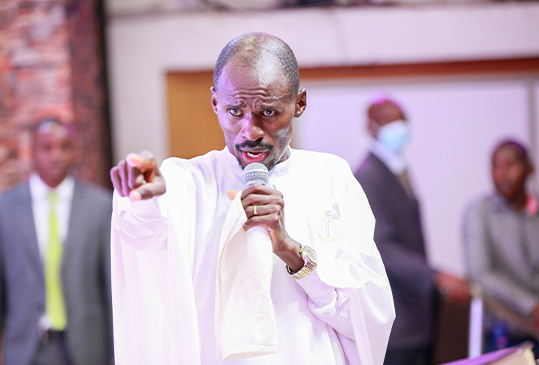Many Kenyans have expressed anger and disbelief after New Life Prayer Centre and Church founder, Apostle Ezekiel Odero, made controversial remarks about the recent Diani plane crash that claimed 11 lives.
His comments, which he shared during a Thursday church service, have drawn sharp criticism from the public, with many accusing him of using a tragic event to gain attention and manipulate emotions.
The crash, which happened on October 28, involved tourists who were travelling from Diani to the Maasai Mara. In his sermon, Pastor Ezekiel claimed that he was meant to travel on the same plane but avoided the journey after receiving what he described as a divine warning.
According to him, this “revelation” came to him during prayers the previous night, prompting him and his wife to take the train from Mombasa to Nairobi instead.
He narrated to his congregation how he allegedly foresaw his own death had he taken the flight, adding that he even had proof that he never used his air tickets.
While his story was dramatic and emotional, Kenyans online quickly began to question its accuracy. Many pointed out that the flight he mentioned was not even travelling to Nairobi but to the Maasai Mara, which made his claim inconsistent with the known facts of the crash.
Others wondered how someone who said he had divine insight into such a tragedy could remain silent instead of warning others or praying for the safety of those on board. For many, his remarks appeared to be an attempt to create a sense of supernatural importance around himself rather than a genuine expression of concern for the victims.
The backlash has been fierce and widespread. On social media, Kenyans criticized him for being insensitive and for turning a national tragedy into a personal story of supposed prophecy.
Some argued that his statement showed a lack of empathy toward the families mourning their loved ones. “It’s wrong to use a fatal accident as a stage for self-promotion,” one person wrote online.
Others said that this kind of behaviour has become too common among some religious leaders, who use emotional storytelling to maintain influence over their followers.
Public discussions following the incident have gone beyond Pastor Ezekiel himself, raising broader questions about the role of religion and accountability in Kenya.
Many people have urged the government and regulatory bodies such as the Kenya Film Classification Board to monitor and take action against public religious statements that could mislead or emotionally exploit the public.
Critics argue that without proper oversight, some preachers will continue making unverifiable claims and using faith as a shield against scrutiny.
Pastor Ezekiel has faced controversy before, especially after being linked to the Shakahola cult investigations involving Pastor Paul Mackenzie.
Although he denied any connection, his current statements have brought him back into public debate, renewing concerns about how spiritual authority can sometimes be misused.
For the grieving families of the 11 victims, his words have added more pain to an already devastating moment.
They see his comments as disrespectful and untimely. Despite this, Pastor Ezekiel has not apologized or offered any clarification, and his supporters continue to defend him, calling the criticism unfair and spiritually motivated.





















Add Comment